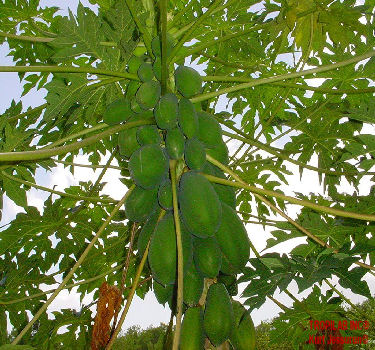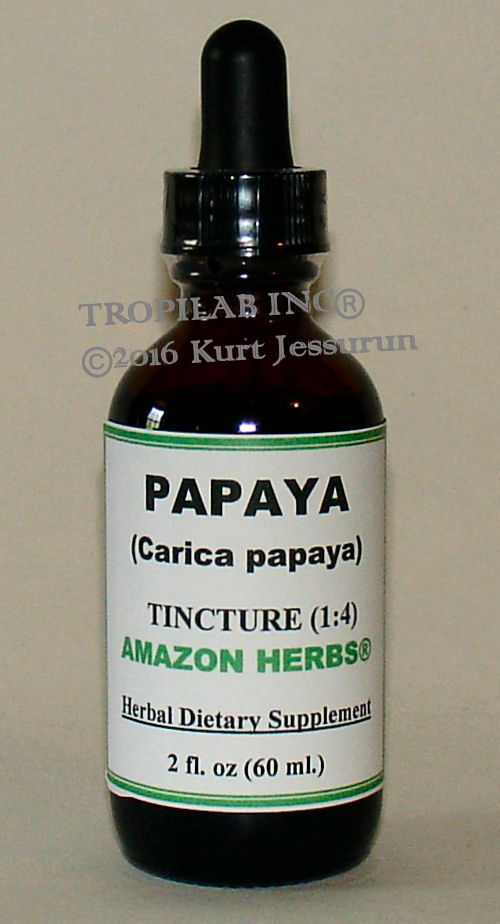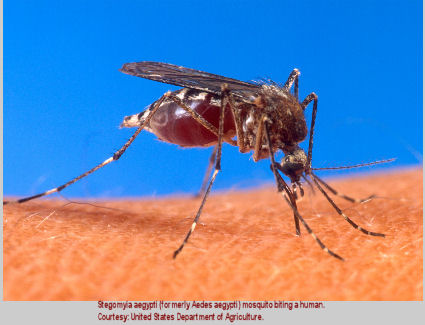 |
 |
| PAPAYA TEA (infusio Carica papaya) from AMAZON HERBS® |
 Overview
OverviewCarica papaya contains the enzyme papain, present in the fruit, stem and leaves. Meat can be tenderized by wrapping it in a papaya leaf before cooking. It contains biologically active compounds such as chymopapain and papain, which are aids in digestion. These natural enzymes accelerate reactions within body cells. In the human body, the pancreas produces enzymes that break down foods into nutrients. Individuals who have cystic fibrosis (genetic disorder that affects mostly the lungs but also the liver, kidneys and intestine) or diseases of the pancreas may not produce enough natural enzymes to digest foods properly. Papaya leaf contains high amounts of vitamins A, C, E, K, and B complex (especially B17). Phytochemicals The green fruit is reported to contain protein, fat, carbohydrate, fiber, ash, Ca, P, Fe, 7 mg Na, K, beta-carotene equivalent, thiamine, riboflavin, niacin, ascorbic acid and vitamin E. It also contains high amounts of vitamins A, K, B Complex and B17. The glycoside, carposide, and the alkaloid, carpaine, pseudo-carpaine, D1-piperideine alkaloids, dehydrocarpaine I and II, water, caoutchouc-like substances, pectinous matter and salts, malic acid, papain, resin. Fatty oil, volatile oil, a glycoside, caricin, and the enzyme, myrosin. Saturated acids (palmitic, stearic, and arachidic) unsaturated acids (oleic and linoleic), bactericidal aglycone of glucotropaeolin benzyl isothiocyanate, sinigrin, the enzyme myrosin, and carpasemine. Flath and Forrey (1977) identified 106 volatile components in papaya. Pharmacology  Papain is proteolytic, meaning that it digests (non living) proteins.
Papain is proteolytic, meaning that it digests (non living) proteins.Frequently it is included in prescription combinations of digestive enzymes to replace what individuals with cystic fibrosis or pancreas conditions cannot produce naturally. Because it improves digestion in general, papain has also been used orally to treat less serious digestion disorders (bloating and chronic indigestion). Papain also is used to treat arthritis and intestinal worms. Proteolytic enzymes such as papain may decrease pain and inflammation associated with rheumatoid arthritis, improve healing of injuries, and reduce swelling after surgery. The softening and disintegrating qualities of papain have been taken advantage of in the treatment of warts, corns, sinuses and chronic forms of scaly eczema and other hardness of the skin. In studies of cancer patients, oral enzyme supplements containing papain helped to relieve treatment side effects such as mouth sores and difficulty in swallowing. Phyto-chemicals in papain may increase immune-system function and may also promote the release of natural chemicals that attack tumor cells. Researchers exposed 10 different types of cancer cell cultures to four strengths of papaya leaf extract and measured the effect after 24 hours. Papaya slowed the growth of tumors in all the cultures. To identify the mechanism by which papaya checked the growth of the cultures, the team focused on a cell line for T lymphoma. Their results suggested that at least one of the mechanisms employed by the papaya extract is inducing cell death. In a similar analysis, the team also looked at the effect of papaya extract on the production of antitumor molecules known as cytokines. Papaya was shown to promote the production of Th1-type cytokines, important in the regulation of the immune system. For that reason, the study findings raise the possibility of future use of papaya extract components in immune-related conditions such as inflammation, autoimmune disease and some cancers. Papain may lessen inflammation, as well. All of these potential effects make preparations containing papain useful as an addition to cancer therapy. An injectable form of the enzym chymopapain has been used to treat herniated ("slipped") discs in the spine. An oral prescription product containing papain and other enzymes has orphan drug* status in the United States for the treatment of multiple myeloma, a form of bone marrow cancer. In a study of individuals with Herpes zoster (shingles), an oral papain product was as effective as a prescription antiviral medication in resolving pain. A year-long observational study of more than 400 women found that those who ate papaya at least once a week were less likely to have chronic infections with human papilloma virus (HPV), a common sexually transmitted disease. "An orphan drug has received approval from the U.S. Food and Drug Administration (FDA) because it shows effectiveness for treating severe or rare diseases that usually have few other treatment options. Applications Papaya Leaf has been used as an aid for stomach ailments, due to its enzyme contents. Papaya Leaf especially aids in the digestion of proteins, but also helps to digest carbohydrates and fats. Papaya leaf extract as an herbal dietary supplement (herbal tincture and medicinal tea), also shows promise as an aid in combating ulcers. Dengue and Chikungunya  In Malaysia, Papaya leaf extract is used to increase low blood platelets count in Dengue fever
and Chikungunya.
In Malaysia, Papaya leaf extract is used to increase low blood platelets count in Dengue fever
and Chikungunya.Low platelet count, means that the blood possesses too few thrombocytes or specialized blood cells called platelets that help to aid in blood clotting. Dengue is caused by Aedes aegypti mosquito. It is characterized by fever rash, joint pain and muscle pains. Symptoms can range from mild to severe (life-threatening). The Chikungunya disease is transmitted in the same way as dengue fever to humans by the virus- carrying Aedes mosquitoes. The common symptoms of this virus infection are fever and severe joint pain. Other symptoms may include headache, muscle pain, joint swelling, or rash. Natural ways to treat these diseases are with plants that increase the dwindling platelet count of the blood (Thrombocytopenia), without notable effects in red blood cell and white blood cell counts. Dosage Tincture: 1 - 4 ml. daily Infusion (herbal tea): 1 - 2 cups daily Caution / side effects Do not use this product if you are pregnant, nursing, have recently had surgery, currently taking anti-thrombolytic agents, blood thinners or if you have cystic fibrosis. Reference Buck JE, Phillips N. Trial of Chymoral in professional footballers. Br J Clin Pract.1970 Sep;24(9):375-7. Craig RP. The quantitative evaluation of the use of oral proteolytic enzymes in the treatment of sprained ankles. Injury. 1975 May;6(4):313-6. Fisher JD, Weeks RL, Curry WM, Hrinda ME, Rosen LL. Effects of an oral enzyme preparation, Chymoral, upon serum proteins associated with injury (acute phase reactants) in man. J Med. 1974;5(5):258-73. France LH. Treatment of injuries with orally administered Varidase as compared to Chymoral and Tanderil. Praxis. 1968 May 14;57(19):683-5. Gal P, Tecl F, Skotakova J, Mach V. Systemic enzyme therapy in the treatment of supracondylar fractures of the humerus in children. Rozhl Chir. 1998 Dec;77(12):574-6. Hingorani K. Oral enzyme therapy in severe back pain. Br J Clin Pract. 1968 May 5;22(5):209-10. Rathgeber WF. The use of proteolytic enzymes (chymoral) in sporting injuries. S Afr Med J. 1971 Feb 13;45(7):181-3. Schwinger O. Results of oral enzyme therapy in wounds of muscles, tendons and bones after accidents. Wien Med Wochenschr. 1970 Sep 5;120(36):603-5. Duskova M, Wald M. Orally administered proteases in aesthetic surgery. Aesthetic Plast Surg. 1999 Jan-Feb;23(1):41-4. Hoernecke R, Doenicke A. Perioperative enzyme therapy. A significant supplement to postoperative pain therapy? Anaesthesist. 1993 Dec;42(12):856-61. The above presentation is for informational and educational purposes only. It is based on scientific studies (human, animal, or in vitro), clinical experience, or traditional usage. For many of the conditions discussed, treatment with prescribed (RX) or over - the - counter (OTC) medication is also available. Consult your doctor, practitioner, and/or pharmacist for any health problem and before using dietary supplements or before making any changes in prescribed medications. |
For the right freight rate, please visit our Webstore page! |